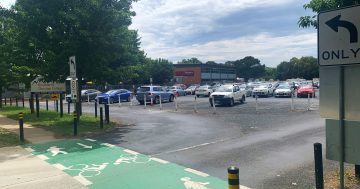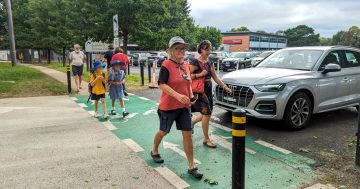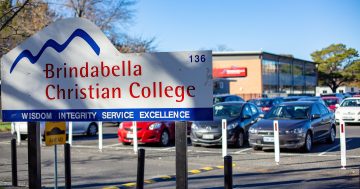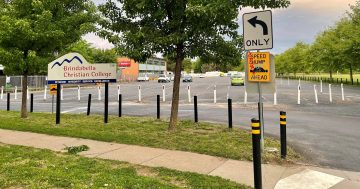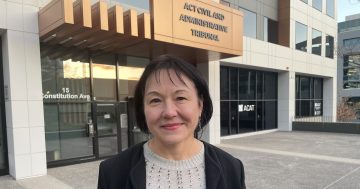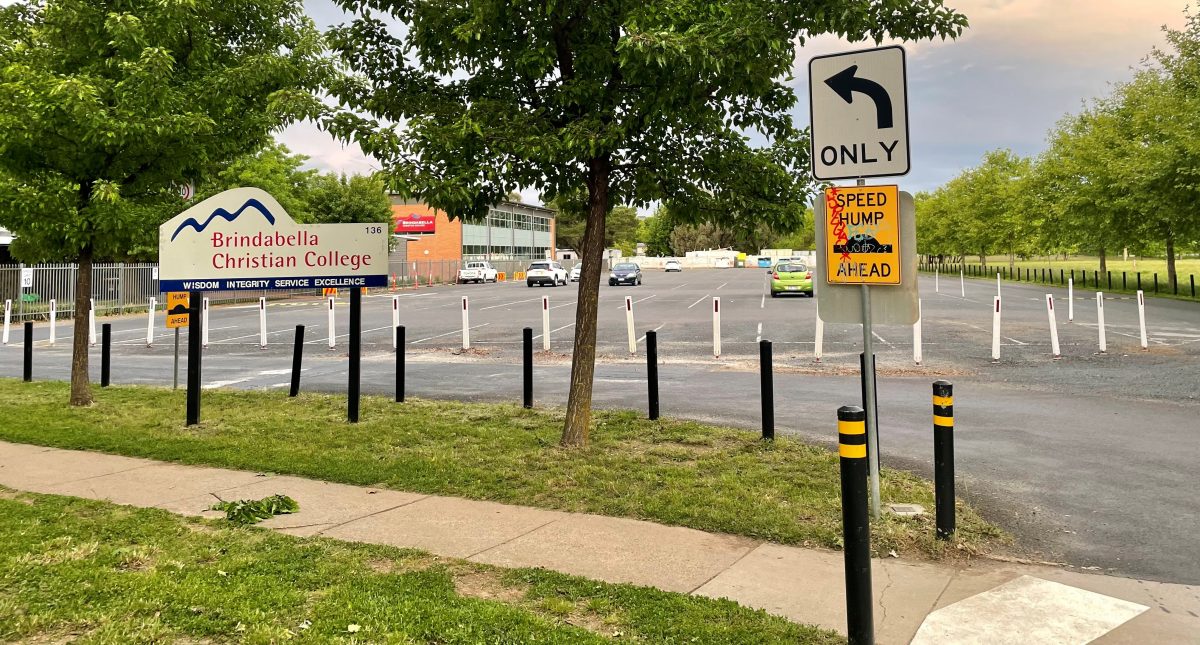
ACAT said it was satisfied it was “in the public interest” to enforce a controlled activity order prohibiting the use of the land as a car park and drive-through access point, which will come into effect at the end of the current school term. Photo: Region.
Brindabella Christian College will need to cease using its car park that was installed without development approval by next month, the ACT Civil and Administrative Tribunal (ACAT) has ruled.
The private school’s sealed car park on public land formed the basis of a dispute between the Lyneham Community Association (LCA) and the ACT Planning and Land Authority, which was heard in the tribunal on Monday and Tuesday (13 and 14 November) before a decision was made on Tuesday afternoon.
The LCA has long opposed the college’s appropriation of the land, which it operates as a sublease through Transport Canberra and City Services. It says the college should not be able to privatise public land that is urban open space, that the car park is unsafe, and the school’s lack of transport planning is contributing to traffic issues around the college and the nearby Lyneham Primary School.
The LCA applied to the ACT Government for a controlled activity order, but this was refused, and it appealed this decision in ACAT.
The tribunal said it was satisfied it was “in the public interest” to enforce a controlled activity order prohibiting the use of the land as a car park and drive-through access point, which will come into effect at the end of the current school term on 7 December.
The controlled activity order will mean the land ceases to be used as a car park and an access point for dropping off and picking up school children.
“Vehicular access to the land is to be blocked by a locked chain, steel bollard or the like from the last day of the current school term,” ACAT senior member Michael Orlov said.
The controlled activity order would require the demolition of the car park and reinstatement of the land 12 months after the order is made unless the college obtains development approval to use the land.
The verge crossing would also be demolished and the curb and footpath would be reinstated before the commencement of the next school term in 2024.
Mr Orlov said the tribunal will give its reasons at a later date.
LCA member Kate Bradney told Region she cried when Mr Orlov made his orders.
“The car park isn’t safe, and it’s not permitted, and finally, someone in a position of power decided to take action,” she said.
“I couldn’t really believe what I had heard. It was such an incredible feeling of finally being heard.”
“But it’s bittersweet because I can’t fathom why it fell on our shoulders and why the ACT Government refused to help us keep our kids safe, and protect our public land, and uphold our laws.
“Children from both schools were put at risk by the unsafe car park, and it’s an incredible relief that we can keep our community safe.”
Ms Bradney said she was motivated to act on the car park after frequently seeing near misses where an accident could have happened on the road, and “one particular near miss that still gives me goosebumps”.
“That’s when I realised if I didn’t do something, someone was going to be seriously injured.
“I couldn’t understand how such a poorly designed car park could have been developed that didn’t fit the standards and codes, and so I started digging.
“It’s the [college’s] responsibility to implement a safe and a legal transport plan for their school community that doesn’t rely on them deliberately and repeatedly undermining the ACT’s laws and putting local children and the community at risk.
“It’s in their hands now, and we hope they care and support their school community so we can all arrive at school safe.”
The row over the car park on a section of the Lyneham playing fields began in 2009 when it was established informally about the time the school built on its previous car park on school land.
The community association says that in late 2016 the school sealed the car park despite the planning authority rejecting a request earlier in the year for a direct sale of the land to complete the project, advising that a Territory Plan Variation would be required and that the development would be in breach of the Planning and Development Act.
The tribunal heard that the college had achieved “the trifecta of non-compliance”: the car park was in breach of the purpose clause of the sublease between the school and the Territory, its development is prohibited as the land is zoned as PRZ1 (urban open space), and a development application was required but never supplied.
While the LCA says the existing situation posed a safety risk to schoolchildren, the tribunal also heard that removing the car park would result in traffic congestion and other safety concerns.
A senior traffic engineer who gave evidence to the tribunal said that the loss of the car park, which has approximately 100 spaces and is typically full at pick-up and drop-off times, would likely result in vehicles being displaced onto the surrounding local roads, making an already busy street worse.
He said the most significant safety issue lies in dropping students off in the street, as this increases congestion and risk from children crossing the road as they may not be dropped off on the right side of the street.












